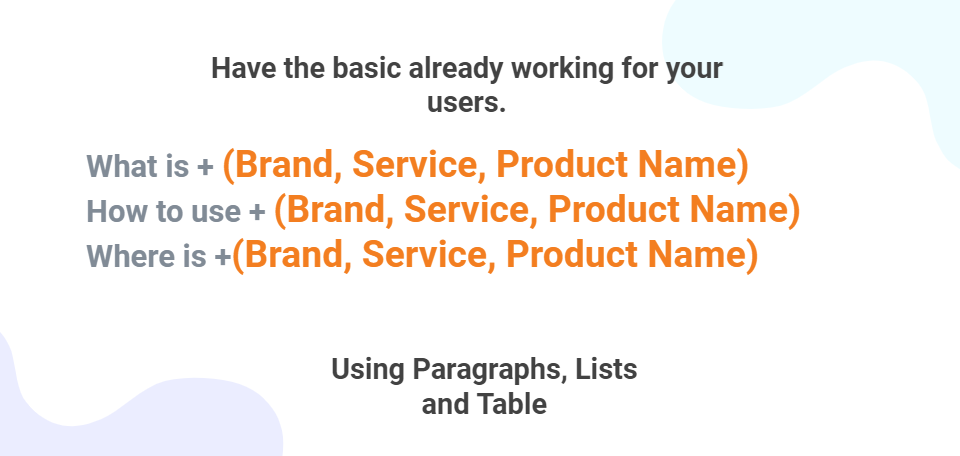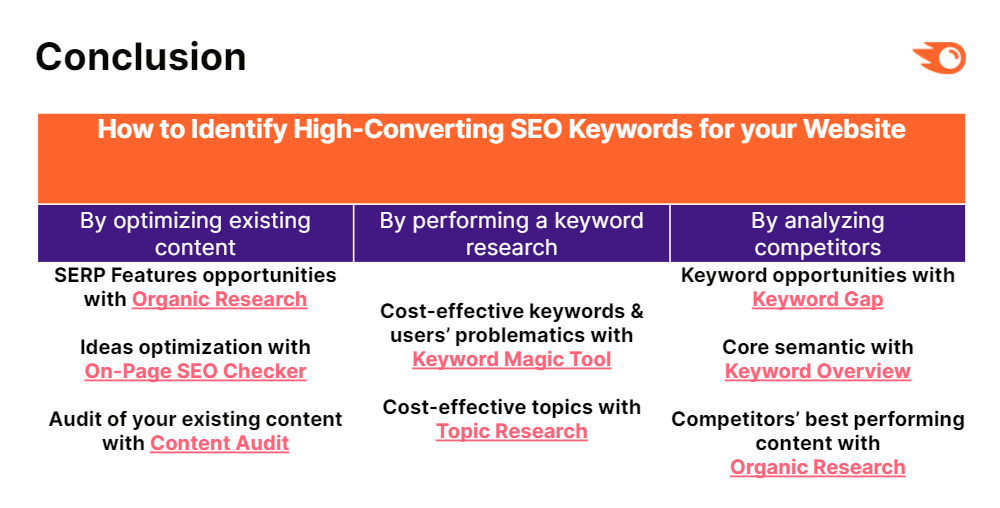Search Sessions – How to Identify High-Converting SEO Keywords for your Website

SEO can give you a competitive advantage, boost your credibility, create high visibility for your business, and more. It can’t help if you choose the wrong keywords, though. Having the right keywords on your website is one of the most important SEO strategies you can implement! Keywords should be easy to rank for and placed in your content to help bring in traffic that converts into customers.
In this edition of Search Sessions, we were joined by Fernando Angulo, Senior Market Research Manager at Semrush, and industry leader in keyword research. Fernando Angulo has 10+ years of experience doing SEO And Content. He shared his proven strategies to help you be more effective and creative when building your strategy.
Make sure to watch our full Search Sessions for all the incredible insights you need to know for a successful keyword research strategy:
How to Identify High Converting Keywords for your Website
When creating content, there are multitudes of ways to get new opportunities. Start by optimizing the content that you already have, and also perform keyword research to get new ideas. Analyze your competitors’ content and keyword profile. Here are some strategies and tools from Semrush for you to consider:
Optimization of existing content
Recommended workflow:
- Find SERP Features opportunities
- Optimize target pages for specific keywords
- Audit your content to identify your page’s weaknesses
Organic Research
Discover content opportunities by identifying SERP Features not linking to your domain. Optimize your content for SERP Features in order to improve your CTR and your content for Featured Snippets & People Also Ask. Featured snippets extract content from the page that answers the query in the most specific way. PAA is needed when a user conducts a search that either is not specific enough to identify their true intent.
On-Page SEO Checker
Configure On-Page SEO Checker to get optimization ideas for your target pages. Optimize your target pages for selected keywords in a specific location. Review your content ideas & follow our advice to improve your pages, SEO strategy, SERP features, content, semantic & backlinks.
Content Audit
Run Content Audit to identify weaknesses in your content. This helps you to find pages that need your attention. Use Content Sets to easily identify pages that could be better optimized. Connect your Google Search Console to analyze articles’ performance. Pairing Content Audit with your Google Search Console accounts will ensure that you are getting the most complete and up-to-date data for your articles. Review your article’s content and collaborate with members of your team. Review its content and performance, set tasks, and collaborate with your team members.
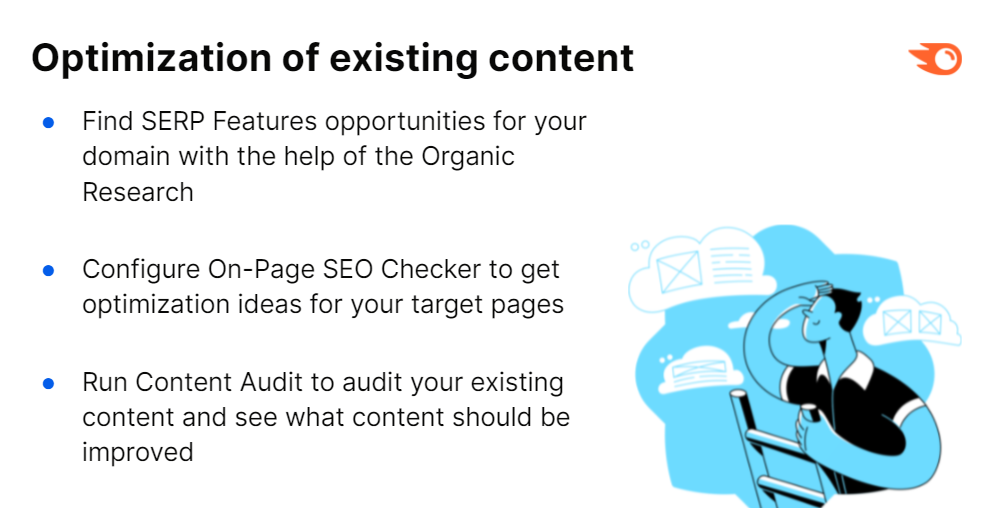
Keyword Research & Topic Analysis
Recommended workflow:
- Identify the audience interests for your topic
- Analyze your users’ problematics
- Find cost-effective topics & cost-effective keywords linked to that topic
Keyword Magic Tool
Identify the most researched topics for your keyword. Sort keywords by volume and analyze the most popular semantic groups. Find cost-effective keywords by combining keyword difficulty & volume. Use volume & keyword difficulty filters to find keywords with a high volume and a low keyword difficulty. Unlock a brand new source of targeted traffic with the help of related keywords. Find variations of your seed keyword. Related keywords help you to expand the breadth of your web content coverage for your niche topics.
Consider most popular Questions for content creation & optimization. Consider Questions filter to discover questions people search in Google to deliver interesting content to your audience. It’s an easy way to find ideas that match your audience’s interests. Find questions that trigger Featured Snippets & People Also Ask SERP Features. Adapt your content to the questions to get a higher chance of ending up in a Featured Snippet or PAA.
Topic Research
Identify topic ideas for a specific location. Find cost-effective content ideas for your location. Discover the most popular headlines, questions, and related searches linked to your topic. Prioritize topics to find out the most effective ones. Filter by topic efficiency to find cost-effective topics & make sure to keep an eye on trendy topics.
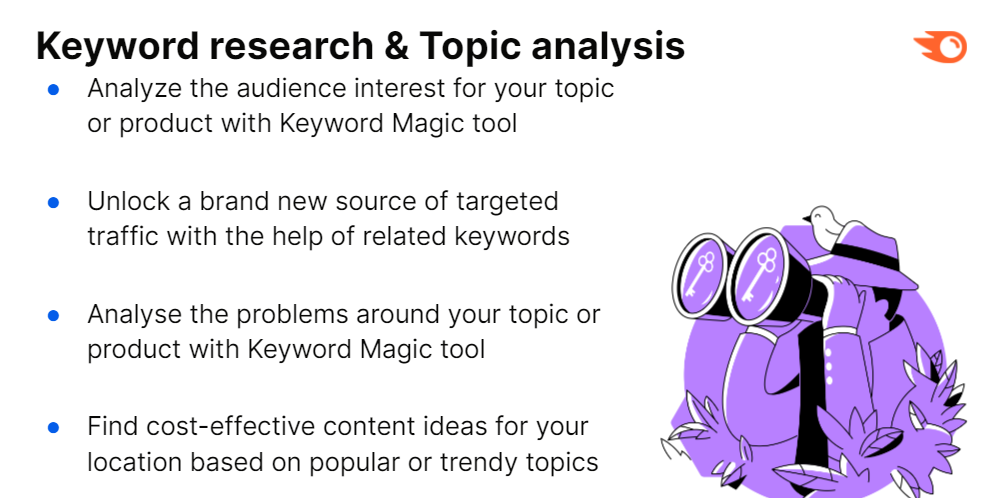
Competitive analysis
Recommended workflow
- Run a keyword SWOT analysis for up to 5 keyword profiles
- Analyze the Search Engine Result Page to easily build your website’s core semantic
- Discover competitors’ best performing content
Keyword Gap
Run a keyword SWOT analysis for up to five keyword profiles and build your website’s semantic core by comparing up to five keyword profiles. Check missing keywords that show content potential for your domain. Find the keywords your domain is not ranking for but your competitor is to get new content ideas.
Keyword Overview
Find competitors ranking for a keyword of your industry. Find out who’s ranking for your keywords in a specific location. Analyze the keywords of your competitor’s pages to easily get ideas to build your core semantic. Competitors’ product pages can be a gold mine to find keywords to build your page’s core semantic.
Organic Research
Discover your competitors’ best-performing content and by category. Our Pages report helps you to find the best performing organic pages of your competitors. Filter with keywords to find your competitor’s most popular pages by category.
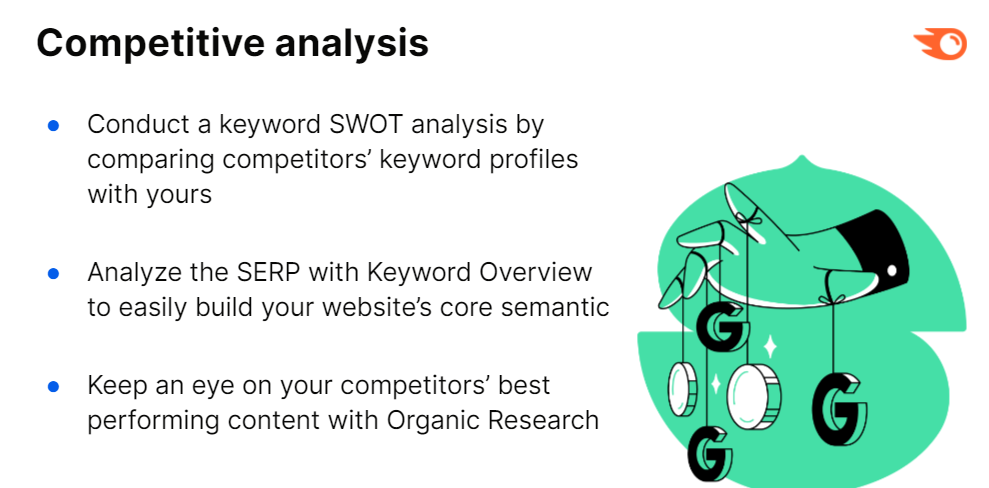
Featured Snippets
You want to aim for your content to be selected for Google’s Featured Snippets. Consumers are driving the conversation, and they want to make educated choices without intrusive ads – which they do not trust.
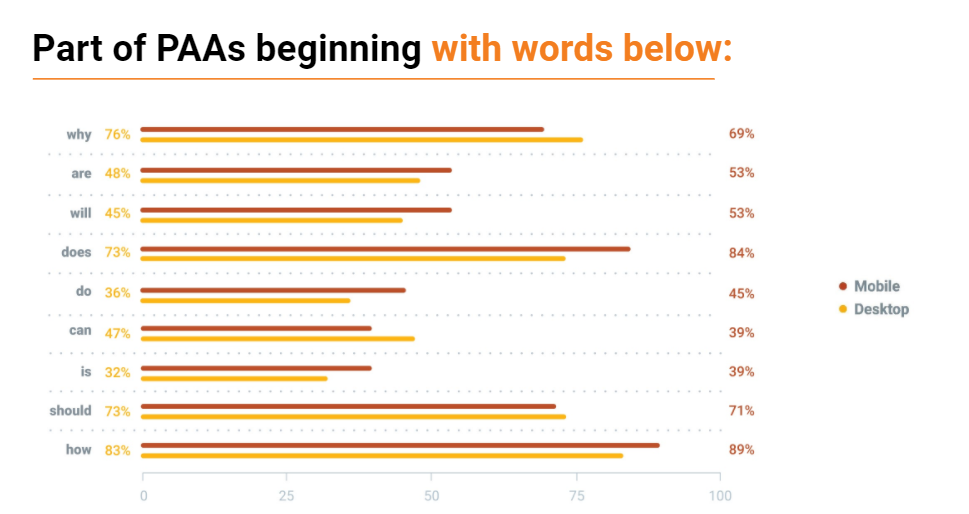
Text length for Featured Snippets and voice search answers is nearly the same for every device: around 42 words on average. To place in Featured Snippets, you need to have your keyword ranked in the top 5 positions.
